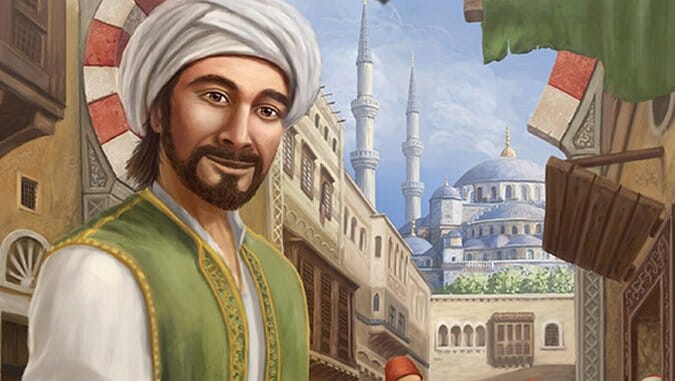Istanbul Boardgame: Family Strategy

Istanbul won 2014’s Kennerspiel des Jahres award, given to the best advanced-strategy game of the year, previously won by 7 Wonders and Village. The award is now separate from the Spiel des Jahres, which honors the best family-strategy or mainstream game of the year, and went in 2014 to Camel Up. Istanbul is a great game, worthy of some honor here, but it’s not a particularly advanced or difficult game, easily understood by my eight-year-old daughter (although she’s pretty sharp, in my unbiased opinion), and probably would have been a better choice for the mainstream prize rather than the expert-level game award.
In Istanbul, players represent merchants in a Turkish bazaar who work to be the first to acquire five rubies (six in a two-player game) and win the game. Players move around a 4×4 board of tiles with the help of their assistants, acquiring goods and lira (coins) that can eventually be swapped for rubies, or can be used to fulfill certain other tasks that will earn one ruby each. The board can change each game, and the presence of two different types of currency means there are several varying paths to victory, all readily apparent upon one or two plays—at least three rough strategies: money-centric, goods-centric, and one built around achievements.
The game’s biggest twist is in the movement mechanic; each player’s movement token is actually a stack of tokens, the merchant itself (a slightly fatter disc than the rest) and four slimmer assistant discs, with the player leaving one assistant on each tile s/he visits—unless there’s already one of his/her assistants there, in which case the player can pick it back up. On each turn, the player may move the token stack one or two tiles horizontally or vertically. Once a merchant is out of assistants, the player can move but can’t take any actions until s/he regains one or more of the assistant discs, by revisiting a tile with one on it, by using a bonus card or tile to reclaim one, or by going to the Fountain tile and immediately regaining all of his/her assistants in one shot. That mechanic makes route-planning a central part of the game—you’ll have to retrace your steps on occasion, or you’ll give up every fifth move to go recollect all your peeps. (You can also add one more assistant during the game, which would at least push that to every sixth move.)
You do have one more piece on the board, your “family member,” who is really more the black sheep because he starts out in jail, on the Police Station token. If you move to the Police Station, you can free (break out?) your family member and send him to any tile on the board to take that tile’s associated action. Of course, that makes him a fugitive; if any other player lands on the tile where your family member is on the lam, s/he can send your cousin back to the clink and collect a reward of 3 lira. Still, the family member allows you to make a move beyond the two-tile limit, and helps you avoid the fee associated with bumping into a rival merchant. Those undesirable meetings, called “encounters,” also cost you—2 lira to every other merchant on the tile where you land. With limited spaces to acquire certain goods, you’ll often have to reroute yourself if you’re too cheap or too broke to pay—and if you can’t or won’t pay, you can’t take the tile’s action.
